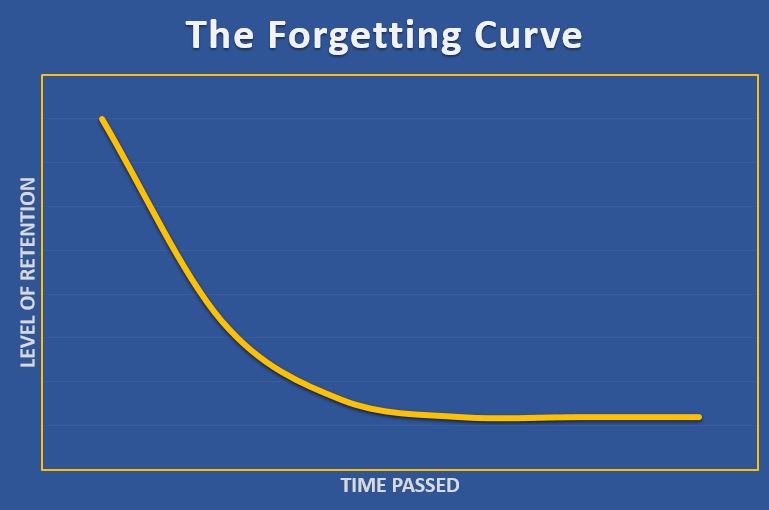Why is it an issue if we struggle to retain information?
Put yourself in the following situations. You’re going for a new promotion and need to learn how to manage a larger team. You are interested in art, but never learned at school, so you take an after-work course. Maybe, you want to live abroad so you need to learn a new language.
Some of these skills we learn for our own interest, but others we have to learn for professional reasons. If we were unable to retain the information we learned, this would make our lives very difficult in the long-term.
We live in a world where there is so much new information available every day and it can feel impossible, if not slightly overwhelming to know where to put our focus when learning something new. We may experience something called the ‘paradox of choice’, where, simply put, there are too many options to choose from that we often end up choosing none.
Procrastination kicks in…
How often have you bought an online course and waited months to start it?
We have all been there. The reason we postpone this learning process is usually because we overthink it. We may also know that we won’t actually use what we learn in real-time, especially if it’s for our own interest.
So, how can we learn new information and actually retain it? Below, we look at five different methods, that will help those who struggle to retain information do it faster and more effectively.

The Forgetting Curve
Before we deep-dive into the tips for retaining information, there is something that you need to understand first. It is called ‘The Forgetting Curve’.
We have all been envious of characters like Mike Ross from the series ‘Suits’, or Sheldon Cooper in ‘The Big Bang Theory’, who famously both have photographic memories. You probably feel like life would be much easier if you, too, had one.
The reality, however, is that at least once in your life, you have probably wandered into the wrong room and can’t remember why you went there, or were in the middle of an interview when suddenly your mind goes blank.
I’m sure these modern examples were not what German psychologist, Hermann Ebbinghaus, based his Forgetting Curve theory on back in the 19th Century, but the basis still rings true today.
Ebbinghaus’ analysis of memory loss was that after learning new information, the information starts to be forgotten at a very quick rate and eventually tapers off, as shown in the graph below. For example, 90% of learners will forget something they have just learned within the first month!

This has huge implications for organisations and individuals. How much money are we wasting on staff training sessions and courses if the majority won’t remember most of the information learned next month?
The good news is that Ebbinghaus’ theory doesn’t have to be true for everyone. He found that when we learn something new, if we repeat the information through different methods over a certain period of time, the rate of decline reduces.
For example, imagine that your organisation sends you on a one-day time management course without any follow-up. It is likely that the majority of attendee’s will not remember this new information in a month’s time.
Imagine, however, that your organisation holds a one day workshop on time management. They then follow up the next day to discuss what was learned. Another follow-up is also held a week later to check that staff are implementing the tools. There is a much better chance that the key information will not be forgotten.
For this reason, we also recommend that Emotional Salary Barometer clients re-use the tool on a yearly basis. This not only allows you to monitor your Emotional Salary over time, but also ensures better retention of the data and action steps provided.
So, in line with Ebbinghaus’ thinking, here are our top five tips to help you if you struggle to retain information:
1 | Increase memory strength and mental performance.
Wii games and brain training apps were not developed for the fun of it. They are science-backed tools that you can use to improve brain performance and memory. You don’t need to spend money on expensive games to achieve this, however. You just have to find something new and challenging to learn.
Check YouTube for tutorial videos on how to do origami, juggling for beginners, or look up new cooking techniques. Spending time practicing a skill that you enjoy and can build on consistently, or learning something new, is a great way to improve muscle memory and brain performance as you get older.
2 | Get more sleep.
A good night’s sleep is very underrated. Why do you think the phrase “let me sleep on it” before making an important decision came about? We can think more clearly and rationally after sleeping as it allows us to properly process and retain information better.
Sleeping shortly after learning new information has been shown to help retention. If you do your best work first thing in the morning or study better in the evenings, this may be why.
3 | Change how you learn.
Every single person learns in a different way. Some are visual and retain information better from graphs, others need to see the data written down.
That is why issues arise in schooling systems that focus on one way of learning. It’s just not effective for large groups of people.
Let’s take history class at school as an example. Students associate history with large amounts of reading and to pass the exam, you are usually required to regurgitate that same information onto the exam sheet. But that is a test of short-term memory, not long-term understanding. Some teachers acknowledge that certain students learn better using different methods and that’s how these short 6-minute videos for learning history were created.
4 | Teach someone else.
Do you remember in school when you used to help your friend study for an exam by asking each other questions? The reason that works so well is that by helping someone else learn the same information, you realise how to explain it in a simpler way and therefore remember it better.
By doing this, you’ll also be able to identify your weaker areas and know where to focus. Studies show that we retain 90% of what we learn when teaching someone else or using it immediately. Which leads me to my next point.

5 | Use the information immediately.
There is no point in learning a new skill if you cannot put it into practice immediately or soon after. Think back to the second language you studied at school. How many of us can say that we could still speak the language now if asked?
If you haven’t thought about French or German since school, there is very little chance you still remember how to ask where the library is. Why is that?
We spent one hour a day, five days a week for three years or more studying the language, but we can’t remember ANY of it now? It’s because we didn’t have to use it in real-life at the time of learning.
That’s it from us for tips on how to better remember the things you learn. We hope that it helps you when you’re doing your next course or taking an important exam.
If you usually struggle to retain information and found the above tips useful, we would love to know about it. If you have any other tips, please share with us in the comments or send us an email. We love hearing from our readers!
Have a wonderful week!